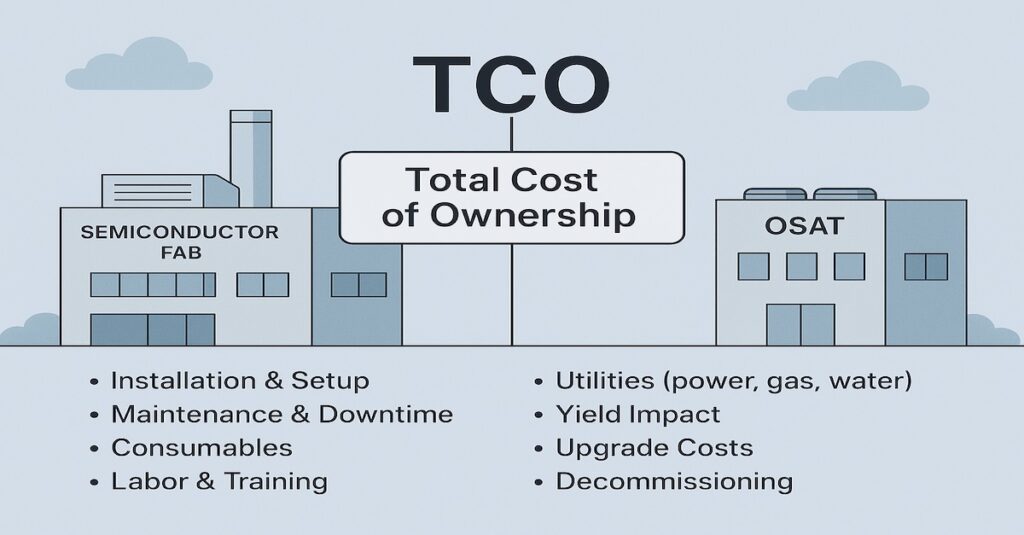Image Generated Using DALL-E
Semiconductor Business
The semiconductor industry is often synonymous with cutting-edge technology, intricate chip designs, and high-stakes manufacturing. Yet, beyond the labs and fabrication facilities lies an equally critical dimension: the business side.
Careers in the semiconductor business domain are as pivotal as technical roles. They shape innovation, drive market relevance, and sustain growth in an industry that powers the modern world.
Key Career Roles In Semiconductor Business
Understanding the diverse roles within the semiconductor business domain is essential to identifying where your skills and interests align. Each role is crucial in ensuring the industry’s smooth operation and growth.
| Role | Responsibilities | Key Skills |
|---|---|---|
| Sales and Business Development | Building client relationships, managing accounts, negotiating contracts, driving revenue | Communication, negotiation, industry knowledge, and customer relationship management |
| Product Management | Defining product roadmaps, managing development timelines, ensuring market fit | Cross-functional collaboration, project management, strategic thinking, and customer insight |
| Marketing and Branding | Creating campaigns, managing content strategies, enhancing brand positioning | Creativity, analytical skills, understanding of market trends, and digital marketing expertise |
| Supply Chain Management | Overseeing vendor relationships, managing logistics, ensuring inventory optimization | Problem-solving, logistics planning, adaptability, and data analysis |
| Finance and Strategy | Conducting financial forecasting, managing budgets, assessing risks, formulating strategies | Analytical thinking, financial acumen, strategic foresight, and decision-making skills |
| Customer Success Management | Ensuring customer satisfaction, supporting product implementation, managing retention | Relationship management, technical understanding, problem-solving, and empathy |
| Regulatory and Compliance Management | Monitoring compliance with regulations, managing certifications, ensuring industry standards | Detail orientation, legal expertise, risk management, and regulatory knowledge |
| Corporate Social Responsibility (CSR) Leadership | Driving sustainability initiatives, promoting ethical practices, managing community engagement | Leadership, policy-making, understanding of sustainability frameworks, and communication |
| Human Resources and Talent Acquisition | Hiring and retaining top talent, developing workforce strategies, fostering organizational culture | People management, organizational development, employee engagement, and cultural understanding |
| Data Analytics and Business Intelligence | Analyzing market data, leveraging insights for business strategies, creating visual reports | Analytical skills, data visualization, strategic planning, and familiarity with AI tools |
| Business Operations | Managing day-to-day operations, optimizing processes, and ensuring organizational efficiency | Process optimization, operational analytics, and leadership |
| Investor Relations | Building relationships with investors, communicating financial performance, raising funds | Financial knowledge, communication, negotiation, and strategic relationship building |
| Strategic Partnerships | Developing and maintaining partnerships, managing collaborations with other companies | Partnership management, networking, business development, and market insight |
| Legal and Intellectual Property Management | Overseeing contracts, safeguarding intellectual property rights, managing patents | Legal expertise, attention to detail, intellectual property knowledge, and risk management |
Skills Needed To Succeed
A combination of technical understanding and business acumen is crucial to excel in this field. Here are the key skills needed to succeed:
Technical Awareness: While you do not need to be an engineer, understanding the basics of semiconductor technology and how chips are designed, manufactured, and tested can set you apart. Familiarity with industry trends will help you better align business strategies with technological advancements.
Analytical Thinking: Semiconductor markets are highly competitive and data-driven. The ability to analyze market trends, assess customer needs, and interpret data to make informed decisions is essential for product management, marketing, and strategy roles.
Problem-Solving Abilities: The semiconductor industry faces supply chain disruptions, shifting regulations, and rapid technological change. Professionals who can think creatively and work collaboratively to solve these issues are invaluable.
Communication and Collaboration: Effective communication is key to bridging the gap between technical teams and stakeholders. Whether pitching a product, negotiating with clients, or working with engineers, strong interpersonal skills are critical for success.
Strategic Planning and Market Insight: A deep understanding of market dynamics, customer behavior, and competitive landscapes is vital. Professionals must be able to anticipate trends, position products effectively, and create strategies that drive business growth.
Project and Stakeholder Management: Semiconductor business roles often involve managing complex projects with cross-functional teams worldwide. Organizational skills, adaptability, and the ability to build strong stakeholder relationships are essential to navigating this fast-paced environment.
Financial Acumen: Understanding financial principles, including cost analysis, pricing strategies, and ROI calculations, is crucial for roles in sales, product management, and business development. It ensures decisions align with both technical feasibility and profitability goals.
As the semiconductor industry continues to shape the future of technology, roles on the business side will remain indispensable. Professionals who cultivate these skills and embrace the challenges of this fast-evolving field can look forward to rewarding and impactful careers.






